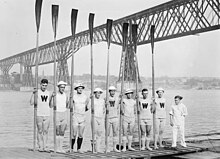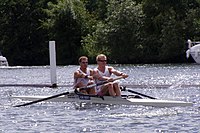
The Harvard Crimson is the nickname of the intercollegiate athletic teams of Harvard College. The school's teams compete in NCAA Division I. As of 2013, there were 42 Division I intercollegiate varsity sports teams for women and men at Harvard, more than at any other NCAA Division I college in the country. Like the other Ivy League colleges, Harvard does not offer athletic scholarships.

The Wisconsin Badgers Crew is the rowing team that represents the University of Wisconsin–Madison. Rowing at the University dates back to 1874. The women's openweight team is an NCAA Division I team. The men's and lightweight women's programs compete at the Intercollegiate Rowing Association (IRA) Championship Regatta because the NCAA does not sanction a men's or lightweight women's national championship. Chris Clark has been the men's head coach since 1996 and Bebe Bryans was the women's head coach from 2004-2023.

Rowing is the oldest intercollegiate sport in the United States. The first intercollegiate race was a contest between Yale and Harvard in 1852. In the 2018–19 school year, there were 2,340 male and 7,294 female collegiate rowers in Divisions I, II and III, according to the NCAA. The sport has grown since the first NCAA statistics were compiled for the 1981–82 school year, which reflected 2,053 male and 1,187 female collegiate rowers in the three divisions. Some concern has been raised that some recent female numbers are inflated by non-competing novices.

The Harvard–Yale Regatta or Yale-Harvard Boat Race is an annual rowing race between the men's heavyweight rowing crews of Harvard University and Yale University. First contested in 1852, it has been held annually since 1859 with exceptions during major wars fought by the United States and the COVID-19 pandemic. The Race is America's oldest collegiate athletic competition, pre-dating The Game by 23 years. It is sometimes referred to as the "Yale-Harvard" regatta, though most official regatta programs brand it "Yale-Harvard".
Harry Parker was the head coach of the Harvard varsity rowing program (1963–2013). He also represented the United States in the single scull at the 1960 Summer Olympics.

The Cornell Big Red is the informal name of the sports teams, and other competitive teams, that represent Cornell University, located in Ithaca, New York. The university sponsors 37 varsity sports, as well as numerous intramural and club teams. Cornell participates in NCAA Division I as part of the Ivy League. The men's and women's ice hockey teams compete in the ECAC Hockey League. Additionally, teams compete in the National Intercollegiate Women's Fencing Association, the Collegiate Sprint Football League, the Eastern Association of Rowing Colleges (EARC), the Eastern Association of Women's Rowing Colleges (EAWRC), the Middle Atlantic Intercollegiate Sailing Association, and the Eastern Intercollegiate Wrestling Association (EIWA).
Stephen C. Gladstone, or Steve Gladstone as he is better known, is one of the premier rowing coaches in the United States. Before retiring, he last coached at Yale University. Previously, he coached at the University of California, Berkeley, where he also served as athletic director.
The now defunct, short-lived National Collegiate Rowing Championship, often simply called the "Cincinnati Regatta," was a quasi- championship for men's and women's collegiate rowing, held in Cincinnati, Ohio, between 1982 and 1996. It pitted the winners of the Eastern Sprints, the Pac-10s, the Intercollegiate Rowing Association (IRA) National Championship and other crews invited at-large. The invited crews usually included Eastern Sprints and Pac-10 medalists, and Harvard and Yale. The IRA National Championship has been considered the national collegiate rowing championship since it was first held in 1895.
The Poughkeepsie Regatta was the annual championship regatta of the U.S. Intercollegiate Rowing Association (IRA) when it was held in Poughkeepsie, New York from 1895 to 1949.

Catholic University Cardinals rowing teams represent the Catholic University Cardinals in men's and women's intercollegiate rowing.

The Columbia University Lions are the collective athletic teams and their members from Columbia University, an Ivy League institution in New York City, United States. The current director of athletics is Peter Pilling.
Todd Kennett is a coach of the Division I Collegiate heavyweight rowing program at Cornell University. In 2006 and 2008, his lightweight varsity boat program captured both the Eastern Sprints Regatta and the Intercollegiate Rowing Association Championships ("IRA").
The Eastern Sprints is the annual rowing championship for the men's Eastern Association of Rowing Colleges (EARC) in Northeast USA.

The University of Toronto Rowing Club (UTRC) was founded on February 10, 1897 and represents the Varsity Blues at local and international regattas. It is the oldest university rowing club in Canada.

The Penn Quakers are the athletic teams of the University of Pennsylvania. The school sponsors 33 varsity sports. The school has won three NCAA national championships in men's fencing and one in women's fencing.

The College Boat Club of the University of Pennsylvania is the rowing program for University of Pennsylvania Rowing, which is located in the Burk-Bergman Boathouse at #11 Boathouse Row on the historic Boathouse Row of Philadelphia, Pennsylvania. Its membership consists entirely of past and present rowers of the University of Pennsylvania.
Gillin Boat Club is the rowing program for St. Joseph's University Rowing and St. Joseph's Prep Rowing. It is situated at the 1,000-meter mark of the Schuylkill River race course in Fairmount Park, Philadelphia, Pennsylvania. Gillin Boat Club was admitted to the Schuylkill Navy in 2004, by a unanimous vote of the Navy's members.

The NCAA Division I Rowing Championship is a rowing championship held by the NCAA for Division I women's heavyweight collegiate crews. The inaugural National Championship was held in 1997 for the top 16 crews in the country, located at Lake Natoma, Sacramento, California. In 2002, the NCAA added championships for Division II and Division III. All races are 2,000 metres (6,562 ft) long. The NCAA does not sponsor men's rowing and women's lightweight rowing championships.

The NCAA Division II Rowing Championship is a rowing championship held by the NCAA for Division II women's heavyweight collegiate crews.

The University of Oregon Rowing Team is located in Eugene, Oregon, and practices at Dexter Reservoir nearby. The team was founded in 1967 and has operated continuously under the guidance of the University. At Oregon, men's and women's teams practice together and compete against other teams regionally and nationally in a number of regattas each year. Even before the passage of Title IX in 1972, the team received national attention for Coach Don Costello's controversial use of female coxswain Victoria Brown in crew, in a previously all-male sport.














